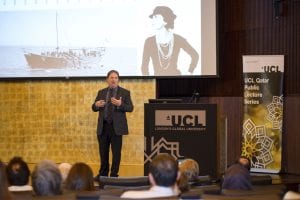UCL Qatar’s collaborations shed fresh light on Doha’s rich architectural heritage
By ucypsga, on 18 December 2017
 Earlier this month, UCL Qatar joined forces with various partner organisations in a series of public events exploring the city of Doha’s architectural history.
Earlier this month, UCL Qatar joined forces with various partner organisations in a series of public events exploring the city of Doha’s architectural history.
Most notably, the British Council Qatar’s fourth annual British Festival included a panel discussion and exhibition brought to the festival thanks to the ongoing partnership between UCL Qatar and Qatar University’s College of Engineering.
‘The Streets of Doha’ panel featured the winners of the Unlimited Doha Design Prize (Deena Terawi, Gizem Kahraman, Ming Teong, Can Askoy and Alex Scott-Whitby) along with special guest speakers including Ibrahim Mohamed, CEO & Chief Architect of Jaidah Group and Dr Fodil Fadli, Head of the Department of Architecture and Urban Planning at Qatar University.
An educational partnership with the British Council
The panel’s wide-ranging discussion covered the distinctive character of Doha’s architecture, the transformation of the city’s built environment and its impact on architectural identity, everyday life and public space.
Professor Rob Carter, Professorial Research Fellow and Research Lead at UCL Qatar, was in the 120-strong audience to hear the discussions take place. Speaking about the event he said, “UCL Qatar is honoured to participate in this year’s British Festival as the British Council educational partners.
“We are proud to be the first British institution in Qatar to offer high quality UK Education, and of the outstanding outcomes we’ve achieved in developing research and capacity-building in cultural heritage in this country. I’m particularly delighted to be involved in this event and exploration of Qatar’s rich urban heritage, which is often underestimated in academic circles and public debate.”
Exchange of knowledge and ideas
Along with the panel, an exhibition showcased the Doha Unlimited Design Award 2016 prize-winning team’s vision for the city. Awarded by the British Council Qatar, the competition saw UK- and Gulf-based designers take part in a week-long design residency under the theme of ‘The Open City’, with a particular focus on mobility and making Doha more open and accessible to all.
Commenting on the collaboration between the British Council and UCL Qatar, Dr. Frank Fitzpatrick, Director of the British Council Qatar, said, “Both the United Kingdom and Qatar are well-known for their remarkable architecture, and we hope to strengthen our relationship with Qatar by creating opportunities for further collaboration and the exchange of knowledge and ideas.”
Ongoing collaboration with Qatar Museum
Following the festival, Professor Carter continued the exploration of Doha’s rich architectural heritage with a lively  public lecture, ‘The History Beneath Your Feet: What Urban Excavation Can Tell Us About Historic Doha and the World.’
public lecture, ‘The History Beneath Your Feet: What Urban Excavation Can Tell Us About Historic Doha and the World.’
The lecture provided further evidence for the breadth of UCL Qatar’s collaboration with external partners. The latest milestone in the successful architectural collaboration between UCL Qatar and Qatar Museums, Carter and Dr Ferhan Sakal, Head of Archaeology Operations of Qatar Museums, shared updates on recent achievements of the partners’ Qatar Old Doha Rescue Excavation.
The excavation helps to document lives of the people of Doha, from the town’s foundations being laid in the early 19th century through to the impact of the discovery of oil in the 1950s.
Following his talk, Professor Carter said: “Together with our partners at Qatar Museums, we have made remarkable progress in uncovering news and important aspects of Qatar’s rich history, building up a detailed understanding of the country’s past.
“The rapid, exciting development of Doha now adds a real urgency to our work – and whilst a great deal has been achieved already, thanks to the level of collaboration to date, we’re enormously excited about the next phase of the project.”
 Close
Close

